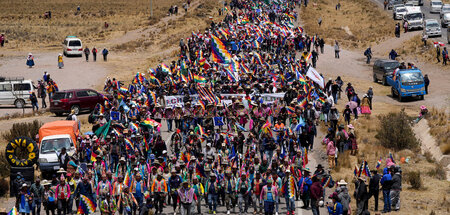Juan Karita/AP/dpa “March on La Paz”, Bolivia’s seat of government, begins in September (El Alto, 22 September 2024)
In Bolivia, the conflict between head of state Luis Arce and former President Evo Morales, who was ousted by right-wing groups in November 2019, threatens to escalate into a state crisis. The two politicians come from the now split left-wing ruling party “Movement for Socialism” (MAS) and want to run in next year’s presidential election. While party leader Morales, who comes from the radical wing of the MAS, accused the government of complicity in the economic crisis, the prosecutor’s office in the Tarija department reviewed old accusations made by the coup plotters in 2020 and filed an arrest warrant against him. Supporters of the former president responded on Monday (local time) with road blockades in several regions of the country. They accused the somewhat reformist Arce of wanting to prevent the former union leader from running again with an “enforcement campaign.”
According to local media, police forces used tear gas against “Evistas” who set up barricades on the highway between Cochabamba and Santa Cruz. Several activists were arrested. Morales’ supporters then rejected an invitation from Presidential Minister María Nela Prada to “dialogue regarding their demands and conditions for lifting the road blockade.” » If you want dialogue, withdraw the police from the blockade points; “If you want dialogue, Luis Arce must declare that he accepts Evo as a presidential candidate and the trial against him will be dropped,” said Ponciano Santos, executive secretary of the agricultural workers and small farmers union CSUTCB, on Tuesday.
Tarija prosecutor Sandra Gutiérrez on Friday announced an arrest warrant against Morales because he failed to appear for questioning on charges of “seduction of minors and human trafficking” against him. These allegations are nothing new. In August 2020, the deputy minister of the coup regime claimed that a young 15-year-old girl became pregnant by Morales and gave birth to a child at the age of 16. The court accused the ousted president of sexual violence against minors and human trafficking.
However, the alleged victim, Noemí Meneses Chávez, who fled to Argentina from its right-wing rulers, disputes these claims. The young woman assured that she met Morales when she was old enough. However, now he is being examined again. “Morales has not left Cochabamba since the public prosecutor’s office threatened him with an arrest warrant, and his supporters are guarding the Trópico area, his political and trade union headquarters and also the headquarters of the coca growers’ association headed by the former president,” the Spanish agency reported Eph. Referring to Morales, Arce escalated the conflict further on Monday. When paying out the state bonuses given annually to school children, he stated that “children should not be touched.”
The leader of the ruling MAS party hit back at X by saying Arce was taking “legal and violent recourse” to end the process of progressive change in Bolivia. Morales accused the government of ignoring the economic crisis and persecuting critics instead of responding to legitimate demands. »Food prices continue to rise, there are families who only eat once a day, families who have lost their homes due to debt, and the Arce government is dedicated to trying and imprisoning national leaders instead of meeting the people’s demands “take care of it,” quotes the portal Latin America Summary from a statement that sounded like an election campaign, to which the former president later added: “Whatever they do and say, we will win the election next year.”






